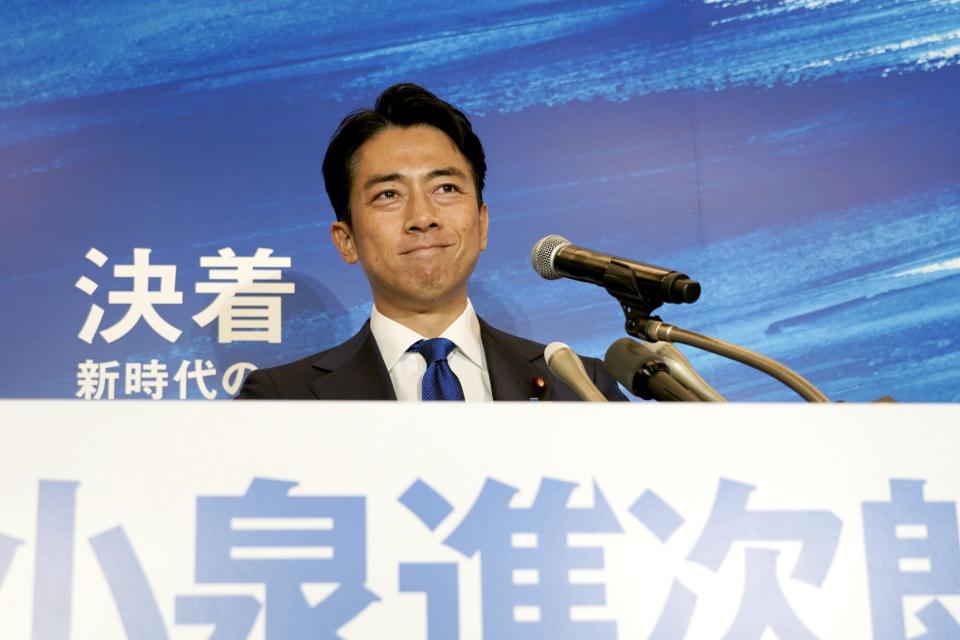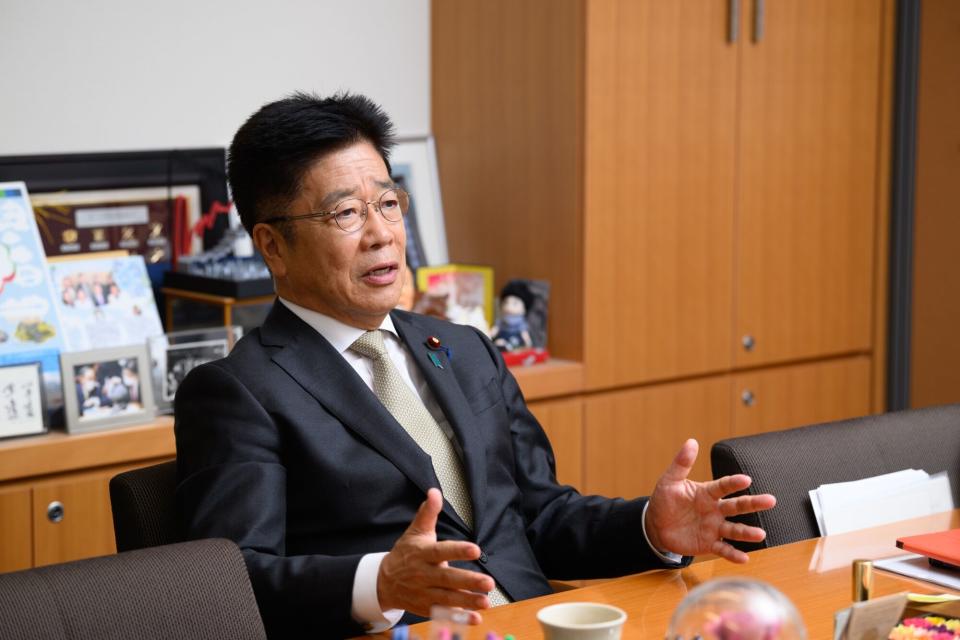Japan Leadership Race Field Grows to Nine With Kamikawa’s Bid
(Bloomberg) -- Foreign Minister Yoko Kamikawa declared her bid to become Japan’s first female prime minister, as she promised to strengthen price-relief measures and boost real wages.
Most Read from Bloomberg
Chicago Halts Hiring as Deficit Tops $1 Billion Through 2025
UC Berkeley Gives Transfer Students a Purpose-Built Home on Campus
Kamikawa is the ninth lawmaker and the second female candidate to make a formal run for the ruling Liberal Democratic Party’s Sept. 27 leadership vote. The head of the LDP is all but assured of becoming prime minister because of the party’s dominance in parliament.
At a press conference on Wednesday, Kamikawa, who has also served as justice minister, said raising real wages is a priority in the face of rising prices for energy, food and resources.
Kamikawa is viewed as an outsider in the LDP leadership race among political analysts. She isn’t among those that the public would most like to see as leader, recent surveys show.
Current Prime Minister Fumio Kishida surprised many by saying in August he wouldn’t run in the election, ending his term after nearly three years as premier.
Here’s a look at some of the contenders to replace Kishida.
Yoko Kamikawa, 71
Kamikawa is a Harvard graduate who ran her own consulting firm before entering politics. She is known for her efforts to promote women candidates, which is an uphill battle given that only about 12% of LDP lawmakers are female. Kamikawa has also come under fire from activists for signing off on as many as 16 executions, including six members of the Aum Shinrikyo doomsday cult, while serving as the justice minister. Kamikawa is an English speaker.
Key Policies:
Economy: She aims to provide strong measures to relieve the impact from inflation and boost real wages
Fiscal: She supported active spending ahead of the last LDP election in 2021 but has since flagged the need for fiscal discipline
Foreign: Has firmly backed trilateral security cooperation among Japan, South Korea and the US and has pressed to advance human rights globally
Energy: Says the possibility of nuclear power is key for stable energy supply
Shinjiro Koizumi, 43
The son of a former premier, Shinjiro Koizumi attracted attention in September 2023 for surfing off Fukushima to ease safety concerns following the release of treated wastewater from the wrecked nuclear plant. A former environment minister and proponent of renewable energy, Koizumi made headlines for becoming the first serving cabinet minister to take paternity leave. Koizumi is generally running first or second in polls asking voters who they would like to become prime minister. He declared his run on Sept. 6.
Key policies
Economy: While in principle continuing Kishida’s policies, he said he will also review firing restrictions as part of labor reforms, and completely allow ridesharing
Defense: Defense spending must be swiftly raised to 2% of GDP
Financial: Has said it’s not the time to discuss capital gains tax, given the recent moves from savings to investment
Energy: Restarting new nuclear reactors is an option; need to reduce the amount spent on fossil fuels
Shigeru Ishiba, 67
A former defense minister, Shigeru Ishiba ranks high in voter surveys of popularity. In his last four tries at the top job, he has struggled to garner enough support from his fellow lawmakers to win the leadership race. In recent weeks, Ishiba has expressed support for the Bank of Japan’s normalization of monetary policy. He announced his candidacy on Aug. 24.
Key policies:
Monetary: Has backed the BOJ’s July 31 decision to raise rates and criticized the government’s past long-term extraordinary easing policy
Economic: Looks to reinvigorate domestic demand to spur growth, rather than relying on foreign trade
Foreign: Has been a strong backer of democracy in Taiwan and building partnerships in the region as a way of deterrence against the likes of China
Sanae Takaichi, 63
A former heavy metal drummer turned hard-line conservative, Takaichi has cited former UK Prime Minister Margaret Thatcher as an inspiration. Currently minister for economic security, Takauchi is among the leading contenders according to recent public opinion polls. She is a frequent visitor to Yasukuni Shrine, a site regarded by Japan’s neighbors as a symbol of past militarism. She announced her candidacy on Sept. 9.
Key policies:
Monetary: Support for ultra-loose monetary policy of stance of former premier Abe; doesn’t think price target has been stably met
Fiscal: Believes a strong economy would bring stable growth without raising tax rates; seeks strategic fiscal spending
Energy: Says Japan should target 100% energy self-sufficiency; Would invest in next-generation nuclear reactors in the latter half of 2020s, look to nuclear fusion in the 2030s
Kono Taro, 61
A former foreign and defense minister with a combatative style, Kono lost to Kishida in the last leadership race due to a lack of backing from his parliamentary peers. Kono is in the middle of the pack in recent public opinion polls. Kono has softened his opposition to nuclear power in recent years. He asks that his name be written Japanese style, with his family name first. He declared on Aug. 26.
Key policies:
Monetary: Supports BOJ policy normalization if inflation remains in line with expectations. Has also said the weak yen is a problem for Japan
Fiscal: Says fiscal consolidation is a priority after large stimulus spending during the pandemic
Digital: Called for ending antiquated practices such as use of name stamps as he seeks wider reforms
Toshimitsu Motegi, 68
A party heavyweight who recently said the BOJ should more clearly show its intention to normalize monetary policy, Motegi is currently in the LDP’s No. 2 position. A former foreign minister, he’s also a Harvard graduate and has a tough guy image within the party. He announced his run on Sept. 4.
Key policies:
Monetary: Has said BOJ should more clearly show its intention to normalize monetary policy to support the yen, as a weak currency might drive up prices
Fiscal: As party secretary-general, Motegi has been a backer of current fiscal policies and is likely to support the status quo. He has advocated returning some of Japan’s increased tax revenues to the people via direct tax cuts
Foreign: As foreign minister, Motegi showed support for peace in the Taiwan Strait, while also planning for contingencies
Takayuki Kobayashi, 49
Kobayashi is considered part of the younger generation of potential leaders. He is a long shot to take over in 2024 but by running now he is letting LDP members and voters know he has his eyes set on eventually becoming premier. He declared his candidacy on Aug. 19.
Key policies:
Monetary: Has spoken about the difficulties of absorbing bonds domestically and the need for seeking overseas investors
Economy: Has said the economy takes precedence over finance indicating that spending for growth is important
Trade: Expressed need for Japan to strengthen supply chains including those for critical minerals like lithium and cobalt that are used in energy transition technologies
Yoshimasa Hayashi, 63
Hayashi is from the dovish wing of the ruling party and a trusted lieutenant of Kishida. He ran unsuccessfully in the LDP leadership race in 2012 and is considered by many political analysts to be an outsider in this year’s election. Hayashi studied at Harvard University and spent most of the Kishida administration as foreign minister. He announced his run on Sept. 3.
Key policies:
Economy: Supports fiscal spending but says it’s important to keep confidence in Japanese government bonds
Foreign policy: Rejects criticism he’s pro-China and says he’s someone who prioritizes dialogue, including with China; says he will seek an immediate end to China’s import ban on Japanese seafood
Energy: In favor of restarting nuclear power plants if their safety is confirmed
Katsunobu Kato, 68
The seven-term lawmaker helped guide Japan through the Covid-19 pandemic, when the country fared better than most of its Group of Seven peers. Kato has not ruffled a lot of feathers in the ruling party, while playing key roles under the last three premiers. Before going into politics Kato was a Ministry of Finance official.
Key policies:
Monetary policy: In a Bloomberg interview, he said Japan should continue to aim for a world where interest rates and prices keep moving
Economic policy: Said would swiftly draw up a supplementary budget for economic stimulus; aims to increase minimum wage to ¥1500 ($10.45)
Fiscal policy: Seeks a balanced approach to managing fiscal health and securing growth
--With assistance from Isabel Reynolds, Yuki Hagiwara, Jon Herskovitz, Yui Hasebe and Yoshiaki Nohara.
(Updates with Kamikawa declaring candidacy.)
Most Read from Bloomberg Businessweek
EV Leases Go as Low as $20 a Month to Help Dealers Clear Their Lots
The Covid Pandemic Left an Extra 13 Million Americans Single
Putting Olive Oil in a Squeeze Bottle Earned This Startup a Cult Following
‘They Have Stolen Our Business’: When You Leave Russia, Putin Sets the Terms
©2024 Bloomberg L.P.



